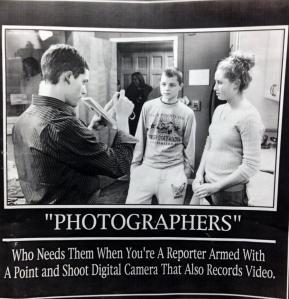
I used to be a servant to deadlines – my ball and chain the ink-stained notepads and pens scattered across my desk. My boss? An editor who would take my writing and will it into submission.
My work days were long and relentless. I often rose before the sun peeked over the horizon and returned home well after it – and all the people it touched – snuck away into the darkness of night. I ate, but sparsely. Ill-prepared meals would be frantically eaten on the fly, either as I was walking to or away from my work area.
It was thrilling. I was a journalist.

Tools of the trade.
In another life, this was the norm. I had voluntarily sought out this daily grind. Like all the others scattered across the newsroom, I was made bold by the masochistic behaviors of my professional lifestyle. We answered to one master – Deadline – and prayed for forgiveness at the alter of AP Style.
For a long time, this was how I made a living, but it’s a life I left behind six years ago. Now I serve from 9 to 5. I can eat whatever I like, when and where I please. I no longer focus my conversations on my ability to write five more inches of copy.
Which is why I was particularly struck by my assignment for last week’s Session post, doled out by Heather Vandenengel of Beer Hobo. Based on the topic of beer journalism, Oliver Gray and I offered a pair of corresponding humorous posts on the triumphant birth and quick death of modern beer journalism.
But we can’t just leave it there, especially with a topic so near and dear to my ink-filled heart.
If you have the time and interest, there are a plethora of responses to our recent Session topic from writers the world over. Together we worked to calculate the life span of beer journalism, or at least tried to determine the formula for what may save a sub-genre that faces challenges of knowledge and skill.
But from the point of view of this former journalist, I honestly believe that everything is going to be alright.
Last week, I pitched Oliver an idea for our dual posts. While sharing our ideas and plans, he astutely offered this critique:
Basically, I see a direct negative correlation: back when journo was big, there were so few breweries, and beer wasn’t worth talking about. Now there are so few newspapers and so many breweries, but no one to report on it.
That really struck me, as someone who came from community newspapers of middling, but not BIG, circulation whose job it was to focus on the local. The trouble was I had to crank out a minimum of 10 stories a week on topics ranging from town board meetings to new construction to school plays to birthdays for 100 year olds. I’ll always remember the never-ending days and nights of local, state and national elections, driving from one event to the next, praying for the end of voting so I could go back to focusing on the other 10 stories I had to write by deadline.
All the while facing the challenges of a downsizing newsroom in a downsizing industry that occasionally is forced to stress quantity over quality.
This is to say that as journalists in smaller markets, you must be a jack of all trades and master of everything. You have to know the ins and outs of everything you cover, all the while fact checking in order to not screw up. It’s a lot of pressure, but an intensity I thrived off of and I know others did as well.
But in relation to beer journalism, I want to believe the problems that have reared in media are due to to a series of factors:
- While craft beer is a national phenomenon, it is inherently local.
- That means with the exception of trade magazines and the occasional Sunday #longread from the New York Times, it’s the regional and community papers that do heavy lifting.
- Presumably, reporters who are burdened with a wide variety of topics and responsibilities are also covering their local beer industry.
Which leads to a second point from Oliver:
Most in [our beer blogging community] are beer people first, writers second. Those talented writers who aren’t into beer, can’t write about it without looking stupid because of such a fervent fanbase.
Being a reporter is really hard. Doing any job certainly causes pressures and problems unique to its industry, but I’ve never felt the kind of OMG, shit-my-pants fear like I did as a journalist. I loved it.

A practical joke given to me by a staff photographer during my journalist days. Along with covering a variety of topics, people and places, I was also responsible for producing video and photos. (Click to enlarge)
So when we worry about beer journalism, we’re worrying about an evolving practice. Much in the way the beer industry has quickly changed into a behemoth of public interest, journalism itself is also mutating, growing extra arms, legs and a third eye worth of abilities out of its former body of print, all the while learning to cover new topics and interests.
I’m not worried about the current state of beer writing because I know that there are professionals who are as fervent as I once was and ready to to take on the complicated task of peeling through the layers of beer as a legitimate subject. It just takes time and it’s made harder when you must focus on all the other news around you. Let’s not forget, the “boom” of beer – in terms of mainstream coverage – is still in toddler stage.
Journalists are out there, thousands of them, willing to lock shackles and drag their ball and chain of writing instruments wherever they must go, listening as their editors shout orders. It’s an indentured servitude that isn’t easy, but is dutifully taken. For this, I’m thankful and have no doubt that we shouldn’t worry.
*Note: For this practice, I consider beer journalism in “traditional” media context. Whenever we discuss bloggers, there will be plenty of good, plenty of bad, and lots of in-between. That’s an entirely different conversation, much like the evolution of journalism itself.

